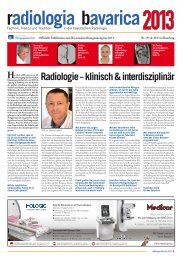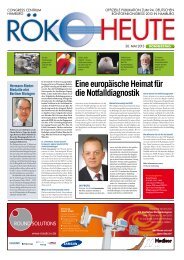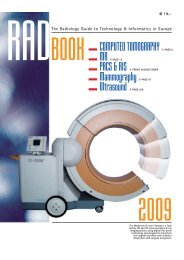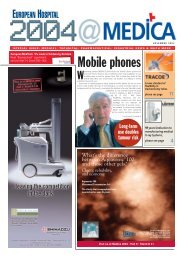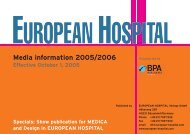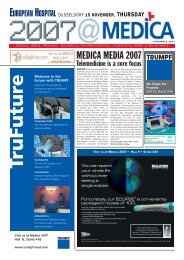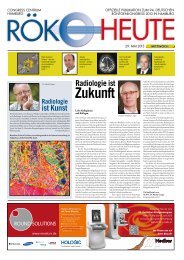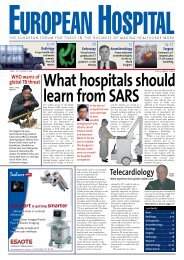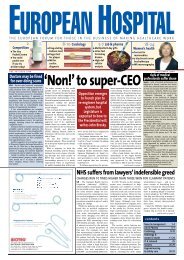PET scanning the heart cuts costs - European-Hospital
PET scanning the heart cuts costs - European-Hospital
PET scanning the heart cuts costs - European-Hospital
Create successful ePaper yourself
Turn your PDF publications into a flip-book with our unique Google optimized e-Paper software.
New initiative aims at clarification<br />
and education<br />
Professor<br />
Silvia Priori<br />
There appears to be little<br />
medical, or public,<br />
awareness or<br />
understanding of<br />
cardiovascular disease<br />
(CVD) in women, because CVD is<br />
often still viewed as a ‘male<br />
disease’, and cardiologists<br />
frequently under-diagnose and<br />
under-treat women because <strong>the</strong><br />
symptoms may differ between<br />
women and men.<br />
Cardiovascular disease (CVD),<br />
which includes coronary <strong>heart</strong><br />
disease and stroke, kills more<br />
people of both sexes than all<br />
cancers combined. However,<br />
according to public awareness<br />
surveys, women think cancer -<br />
particularly of <strong>the</strong> breast - is a<br />
greater risk for <strong>the</strong>m. The truth is<br />
that CVD kills a higher percentage<br />
of women (55%) than men (43%)<br />
in Europe and accounts for more<br />
deaths than all cancers combined.<br />
It is also notable that although<br />
men suffer strokes, women are<br />
more likely to die as a result of a<br />
stroke.<br />
To address this, at a recent<br />
meeting of its 49 national cardiac<br />
societies <strong>the</strong> <strong>European</strong> Society of<br />
Cardiology (ESC) launched <strong>the</strong><br />
Women at Heart initiative, aimed<br />
at medical professionals, because,<br />
<strong>the</strong> ESC points out, women are<br />
under-represented in clinical trials<br />
and <strong>the</strong>ir CVD clinical<br />
manifestations are less well<br />
charted and outlined to <strong>the</strong><br />
medical professional in <strong>the</strong>ir initial<br />
or ongoing training.<br />
Apart from increasing awareness<br />
across Europe, among many o<strong>the</strong>r<br />
activities will be an analysis of<br />
ESC Euro Heart Survey databases<br />
to obtain specific data on women<br />
and CVD, such as <strong>the</strong> differences<br />
between women and men in<br />
specific disease and treatment<br />
areas. Results from <strong>the</strong>se analyses<br />
will be presented at <strong>the</strong> Euro<br />
Heart Survey Symposium at <strong>the</strong><br />
ESC Congress in September.<br />
Professor Silvia Priori, of <strong>the</strong><br />
Fondazione Salvatore Maugeri,<br />
Pavia, Italy, Chairperson of<br />
Women at Heart, and a member<br />
of <strong>the</strong> Board of <strong>the</strong> ESC, said:<br />
‘The analysis of our Euro Heart<br />
Survey databases will be extremely<br />
interesting, as <strong>the</strong>se are large<br />
databases on extensive <strong>European</strong><br />
populations without <strong>the</strong> artificial<br />
representation so often seen in<br />
clinical trials. We have all <strong>the</strong> data<br />
at our fingertips and can reassess<br />
<strong>the</strong>m in a relatively short time.<br />
These data are likely to give us<br />
important insights into<br />
manifestation, treatment and comorbidity<br />
patterns, as well as<br />
CVD and<br />
women<br />
Awarded <strong>the</strong> 2005 Market Leadership Award<br />
hints on treatment and response<br />
trends, in women as compared<br />
with men. I am very much<br />
looking forward to <strong>the</strong> release of<br />
<strong>the</strong>se data at our Stockholm<br />
Congress.’<br />
What is already known is that<br />
women with <strong>heart</strong> disease are up<br />
to ten years older than men and<br />
present with much less obvious<br />
and stereotypical symptoms. They<br />
tend to have <strong>heart</strong> disease later<br />
than men due to <strong>the</strong> cardioprotective<br />
effects of oestrogen,<br />
which plays an important role up<br />
to <strong>the</strong> menopause. However, after<br />
<strong>the</strong> menopause, risks increase<br />
SERVO-i — THE WORLD’S LEADING<br />
VENTILATION BRAND<br />
in <strong>the</strong> global ventilators market, MAQUET Critical<br />
Care has delivered over 100,000 ventilators<br />
uniquely designed to support critical care clinicians<br />
worldwide. This prestigious award, given by <strong>the</strong><br />
independent analyst Frost & Sullivan, recognizes<br />
<strong>the</strong> company's competitive strengths and its<br />
investment in innovation to meet changing<br />
customer needs.<br />
A flexible platform for all patient categories,<br />
SERVO ventilators are known for <strong>the</strong>ir outstanding<br />
clinical performance, reliability and ease of use.<br />
MAQUET's commitment to education, training<br />
and customer support helps to achieve sustainable<br />
improvements in patient outcomes, and ensures<br />
solutions that deliver lasting value. Find out more<br />
at www.maquet.com/criticalcare<br />
MAQUET – The Gold Standard.<br />
significantly and need delicate<br />
management.<br />
In many women, <strong>the</strong> onset of<br />
<strong>heart</strong> disease is more gradual,<br />
accompanied by tiredness ra<strong>the</strong>r<br />
than <strong>the</strong> more commonly<br />
recognised symptoms predominant<br />
in men - e.g. sudden violent chest<br />
pain. Fur<strong>the</strong>rmore, women with<br />
CVD are more likely to die or<br />
suffer disability from a fur<strong>the</strong>r<br />
attack or <strong>heart</strong> failure. Professor<br />
Priori said: ‘The issue is not simply<br />
that men and women are different<br />
per se, but ra<strong>the</strong>r that <strong>the</strong>re are<br />
specific differences between <strong>the</strong><br />
genders in symptom profiles and<br />
CARDIOLOGY<br />
responses to treatment that must<br />
be taken into proper account.’<br />
Physicians’ training is dominated<br />
by male data and trends, and<br />
guidelines focus on such data in<br />
recommending drug dosages and<br />
procedures. Thus women are being<br />
treated as if <strong>the</strong>y are men, despite<br />
<strong>the</strong> notable differences in <strong>the</strong>ir<br />
disease elements.<br />
● The ESC’s Women at Heart<br />
initiative is supported by an<br />
unconditional educational grant<br />
from <strong>the</strong> Bristol Myers Squibb<br />
Foundation.<br />
● Information: www.escardio.org/<br />
initiatives/WomenHeart/<br />
Maquet Critical Care AB<br />
171 95 Solna, Sweden<br />
Phone: +46 8 730 73 00<br />
www.maquet.com/criticalcare<br />
MEMBER OF THE GETINGE GROUP<br />
EUROPEAN HOSPITAL Vol 14 Issue 2/05 11



